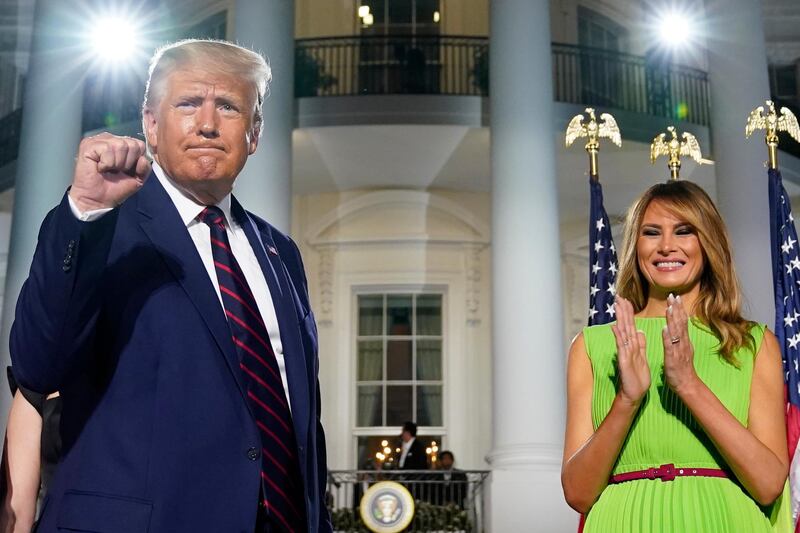In a speech marked by a populist tone and strong attacks on his rival Joe Biden, Donald Trump accepted the Republican nomination for president laying out an ambitious agenda for a second term if he were to win the election on November 3.
"I profoundly accept this nomination for President of the United States," Mr Trump told a packed crowd on the South Lawn of the White House on Thursday evening as protesters outside chanted "vote him out".
Speaking for more than an hour, Mr Trump tried to play down the economic and health crisises facing the US since March as a result of the coronavirus pandemic, promising instead to bring prosperity, rebuild the workforce and defeat the “invisible enemy”.
"We will defeat the virus, end the pandemic and emerge stronger than ever before,” he said.
Early in his speech, Mr Trump hailed the UAE-Israel agreement on normalisation of relations that he helped to broker, calling it a major achievement in the region. “This month we achieved the first Middle East peace deal in 25 years,” he said, thanking both countries for the breakthrough.
He framed the November vote as “the most important election in the history of our country”, painting a big difference between the Republican and Democratic parties and calling Mr Biden the “destroyer of American greatness.”
“Joe Biden is not a saviour of America's soul, he is a destroyer of America's jobs. And if he is given the chance, he will be the destroyer of America's greatness,” Mr Trump said. Without providing evidence, Mr Trump accused his Democratic rival of being too cozy with China, and warned that nobody would be safe if Mr Biden won the presidency.
According to CNN, Mr Trump mentioned his rival 41 times in his speech, portraying him as an ally of the “radical left” who he said would dictate the agenda if Mr Biden was elected.
He reiterated his agenda of opposing bad trade deal and defended his handling of the coronavirus outbreak in the US despite more than 180,000 deaths.
”We are meeting this challenge. We are delivering life-saving therapies, and will produce a vaccine before the end of the year, or maybe even sooner," Mr Trump said.
On foreign policy, Mr Trump listed the killing of Iranian general Qassem Suleimani and ISIS leader Abu Bakr Al Baghdadi among his accomplishments. He also took credit for withdrawing from the Iran nuclear deal and moving the US embassy in Israel to Jerusalem. “When I took office, the Middle East was in total chaos. ISIS was rampaging. Iran was on the rise. And the war in Afghanistan had no end in sight. I withdrew from the terrible one-sided Iran nuclear deal,” he said.
But the speech was short on details of his foreign policy for a second term.
Mr Trump was criticised for breaking the norm by delivering his acceptance speech from the White House, considered “the people’s House”, and without masks or social distancing.
“Something I never thought I’d see: a political convention ready to gavel in at the White House,” commented prominent journalist and anchor Andrea Mitchell.
Something I never thought I’d see: a political convention ready to gavel in at the White House pic.twitter.com/tLUEtfmtSZ
— Andrea Mitchell (@mitchellreports) August 27, 2020
In a tweet before Mr Trump's speech, the Democratic nominee for vice president Kamala Harris slammed the president's response to the pandemic. “The United States has nearly six million confirmed cases of coronavirus, 180,000 lives lost, and more than 50 million claims for unemployment this year alone. It didn’t have to be this way,” she said.
Here’s the reality: the United States has nearly six million confirmed cases of coronavirus, 180,000 lives lost, and more than 50 million claims for unemployment this year alone.
— Kamala Harris (@KamalaHarris) August 28, 2020
It didn’t have to be this way. pic.twitter.com/ee61Zr9j2d
With the conventions over, it is unclear if either party will get a bounce in the polls. Mr Biden’s lead did not grow after the Democratic convention. “Spoiler alert: the conventions aren't going to upend the race,” election data analyst David Wasserman said on Twitter.
From here, the presidential race enters the last stretch that will include three debates between Mr Trump and Mr Biden on September 19, October 15 and October 22.








